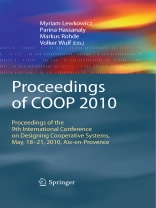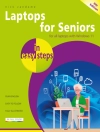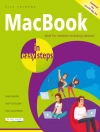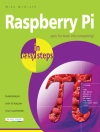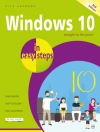COOP 2010 is the 9th edition of the International Conference on Designing Cooperative Systems, being the second European conference in the field of Computer Supported Cooperative Work after ECSCW. The conference brings together researchers who contribute to the analysis and design of cooperative systems and their integration in organizational community, public and other settings, and their implications for policy and decision making. Cooperative systems design requires a deep understanding of collective activities, involving both artifacts and social practices. Contributions are solicited from a wide range of domains contributing to the fields of cooperative systems design and evaluation: CSCW, HCI, Information Systems, Knowledge Engineering, Multi-agents, organizational and management sciences, sociology, psychology, anthropology, ergonomics, linguistics.
विषयसूची
Trends in Scholarly Collaboration.- Distributed Design and Distributed Social Awareness: Exploring Inter-subjective Dimensions of Roles.- Faithful to the Earth: Reporting Experiences of Artifact-Centered Design in Healthcare.- A Reformulation of the Semantic Gap Problem in Content-Based Image Retrieval Scenarios.- Design of a Collaborative Disaster Response Process Management System.- Supporting Collaborative Workflows of Digital Multimedia Annotation.- Change Awareness for Collaborative Video Annotation.- Rethinking Laboratory Notebooks.- Supporting Reflection in Software Development with Everyday Working Tools.- Collocated Social Practices Surrounding Photo Usage in Archaeology.- Direct Deliberative Governance and the Web: The Collaborative Work of Democratic Decision-Making Mediated by an Online Social Environment.- How Creative Groups Structure Tasks Through Negotiating Resources.- The Role of Social Capital and Cooperation Infrastructures Within Microfinance.- Computer Enabled Social Movements? Usage of a Collaborative Web Platform within the European Social Forum.- ‘Keep Up the Good Work!’: The Concept of ‘Work’ in CSCW.- Appropriation of the Eclipse Ecosystem: Local Integration of Global Network Production.- Practices Analysis and Digital Platform Design: An Interdisciplinary Study of Social Support.- Creative Collective Efficacy in Scientific Communities.
लेखक के बारे में
Myriam Lewkowicz is Assistant Professor / Maître de Conférences at UTT . Previously, she has been Projet Director at COG-Net SA and a Research Engineer at the Université Paris Dauphine. Her education includes studies at the Université Pierre et Marie Curie (Paris VI) and the Université Paris Dauphine. She holds a Ph D in Computer Science, which included research on Computer Supported Cooperative Work, teaching Information System Analysis and Design, colaborative work, Project Management and work as a Consultant on Knowledge Management and Collaborative Work. Myriam Lewkowicz’s Specialties include: collective activities analysis, collective problem-solving assistance, multidisciplinary design, designing groupware, project management, and expert knowledge acquisition. Myriam Lewkowicz’s interests are: Information and Communication Technologies, Computer Supported Cooperative Work, E-communities, Knowledge Managament, Management Information System, Sense Making, Human Computer Interaction, Languages and Linguistics and Hermeneutics. Markus Rohde studied psychology and sociology at the University of Bonn and is one of the founders of the International Institute for Socio-Informatics (IISI) and co-editor of the International Report on Socio-Informatics. Since 2004 he has been working as a research associate at the Institute for Information Systems and New Media at the University of Siegen, and since 2008 as research manager for Community Informatics. Moreover, he is an editor of the political science journal ‘Forschungsjournal Neue Soziale Bewegungen’ (New Social Movements). Since 1991, his research has focused on usability engineering of network systems, on virtual organizations, and on ‘organization and technology development’. From 1994 until 1997 he was working as a consultant for medium-sized enterprises and for nonprofit-organizations. From 1997 until 2001 he worked as CEO of AGENDA CONSULT Gmb H. From 2002 until 2004 he was working as a project managerfor IISI. In 2004 he was research associate for Fraunhofer Institute for Applied Information Technology (Fhg-FIT) in Sankt Augustin. In 2007 he was awarded his Ph.D. degree in Information Systems at Roskilde University, Denmark. His main research interests are human-computer interaction, computer supported cooperative work (CSCW), expertise management and blended learning, virtual organizations, non-governmental organizations and (new) social movements. Volker Wulf is a professor in Information Systems and the director of the Media Research Institute at the University of Siegen. At Fraunhofer FIT, he heads the research group User-centred Software-Engineering (USE). He is also a founding member of the International Institute for Socio-Informatics (IISI), Bonn. After studying computer science and business administration at the RWTH Aachen and the University of Paris VI., he got a Ph.D. at the University of Dortmund and a habilitation degree at the University of Hamburg, Germany. In 2001, he worked as a research fellow at the Massachusetts Institute of Technology (MIT), Cambridge, MA. In 2006/07 Wulf spent a sabbatical as a Fulbright Scholar at the University of Michigan, Ann Arbor, and at Stanford University, Palo Alto. His research interests lie primarily in the area of Computer Supported Cooperative Work, Knowledge Management, Computer Supported Cooperative Learning, Entertainment Computing, Human Computer Interaction, Participatory Design, and Organizational Computing. He published more than 170 papers. He edited 10 books among which Expertise Sharing: Beyond Knowledge Management and Social Capital and Information Technology both with MIT Press Cambridge MA and End User Development with Springer Dordrecht are probably best known. As a conference co-chair he hosted the Seventh European Conference on Computer Supported Cooperative Work (ECSCW 2001) in Bonn and Communities & Technologies (C&T 2003) in Amsterdam.
